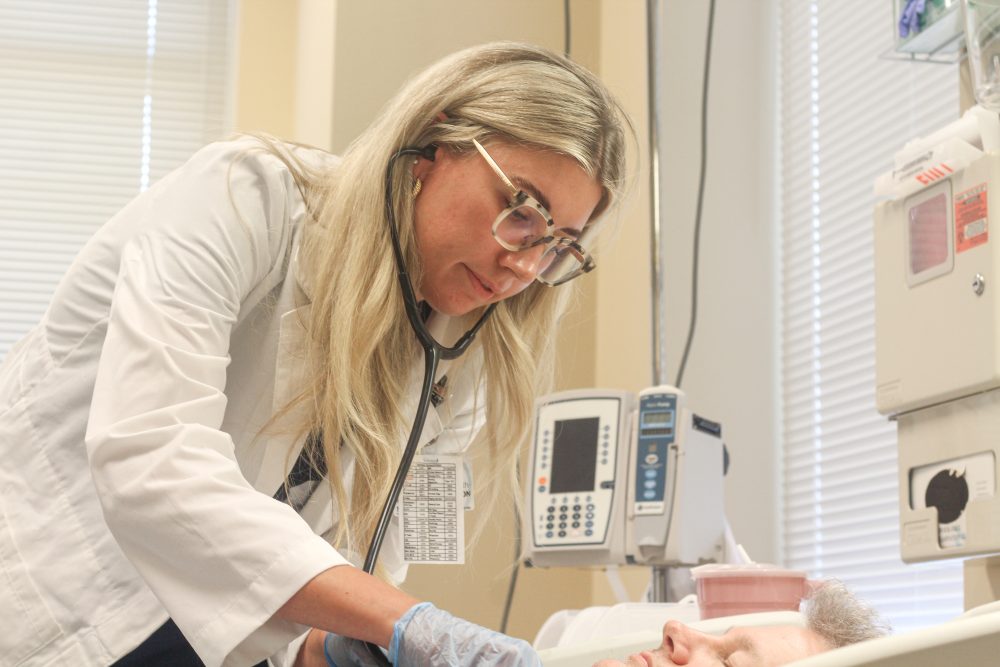Doctor of Nursing Practice

Doctor of nursing practice
Full-Time DNP Plan of Study | Part-Time DNP Plan of Study | DNP Programs
Are you ready to become a leader in our current healthcare system? Do you aim to achieve quality outcomes using the most current evidence available? If you answered, “yes,” the DNP may be right for you. Our Doctor of Nursing Practice (DNP) degree prepares health systems and organizational nursing leaders (non-APRNs) and advanced practice registered nurses (APRNs) to lead nursing practice, organizations, and systems of care through the translation and application of evidence-based research into practice.
Why Choose the UNC Charlotte School of Nursing
- Practice integration tailored to students’ scholarly interests.
- Personalized mentorship throughout the DNP program with faculty who actively engage in nursing practice, research, and scholarship.
- Access to interprofessional courses, innovative technology, college librarian, editing services, and statistical support.
- Flexible and convenient coursework for the post-master’s DNP.
- Rigorous clinical experiences at Atrium Health’s nationally recognized hospitals for the Nurse Anesthesia DNP.
A DNP degree from UNC Charlotte will prepare nurses to synthesize and integrate current, evidence-based research into nursing practice. Students will use evidence to design programs of care delivery that will improve patient care, safety, and organizational outcomes. As a student, you will engage in coursework focusing on evidence-based practice, quality improvement, systems leadership, and health policy, among other key areas.
Programs
BSN to DNP: Nurse Anesthesia Across the Lifespan
We provide students with both the theory and clinical practice required to meet the educational requirements to take the national certifying examination upon graduation The specialty in Nurse Anesthesia Across the Lifespan is offered in partnership with Atrium Health. Clinical experiences are offered at Atrium Health facilities in the Charlotte area.
*Applicants must apply using, both, The UNC Charlotte School of Nursing and Atrium Health Applications.
Application Deadlines
*Selected Applicants will have to undergo an interview process for this program
priority deadline: June 10
final Deadline: Sept. 10
*Applications are accepted on a rolling basis
Program Contact
Post-Master’s DNP
Our post-master’s is designed to prepare health systems and organizational nursing leaders (non-APRNs) and advanced practice registered nurses (APRNs) to lead nursing practice, organizations, and systems of care through the translation and application of evidence-based research into practice.
Application Deadlines
Priority Deadline: APRIL 1
FINAL DEADLINE: JULY 1
*Applications are accepted on a rolling basis
Program Contact
Hands-On Learning Opportunities
Clinical hours are designed to facilitate student learning specific to your primary area of interest and consistent with the DNP Essentials and specialty competencies. These experiences include in-depth work with experts in nursing, as well as other disciplines, and systematically provide meaningful engagement in practice environments for feedback and reflection. Your learning opportunities are designed to enrich knowledge and practical skill foundations in areas that will facilitate achievement of the DNP Scholarly Project.
The Final DNP Project provides an opportunity to integrate new skills into practice and to demonstrate the principles of nursing scholarship and the competencies delineated in the DNP Essentials. The integration of these new or refined skills improves outcomes through organizational and systems leadership, quality improvement processes, and the translation of evidence into practice.
DNP Projects
- Focus on a change that impacts healthcare outcomes either through direct or indirect care.
- Demonstrate implementation in the appropriate arena or area of practice.
- Include a plan for sustainability (e.g. financial, systems or political realities, not only theoretical abstractions).
- Include an evaluation of processes and/or outcomes. DNP Projects should be designed so that processes and/or outcomes will be evaluated to guide practice and policy. Clinical significance is as important in guiding practice as statistical significance is in evaluating research.
- Provide a foundation for future practice scholarship.
DNP Faculty: Experts in Nursing Practice
Our faculty members are experts in nursing practice and actively work in various practice settings. Our faculty are engaged in cutting-edge research with articles appearing in some of the leading research journals in the field, including the American Journal of Nursing, Journal of Professional Nursing, Journal of Nursing Education, Journal of Advanced Nursing, and the Journal of Nurse Practitioners. As part of their service, faculty members participate in professional organizations by leading committee work, acting as journal editors and peer-reviewers, and serving on grant review boards.
Faculty have also been recognized for their teaching, research, and student mentoring as recipients of several prestigious awards including the Teaching Fellows Teaching Excellence Award, the Bank of America Award for Teaching Excellence, and the Board of Governor’s Award for Teaching Excellence.
